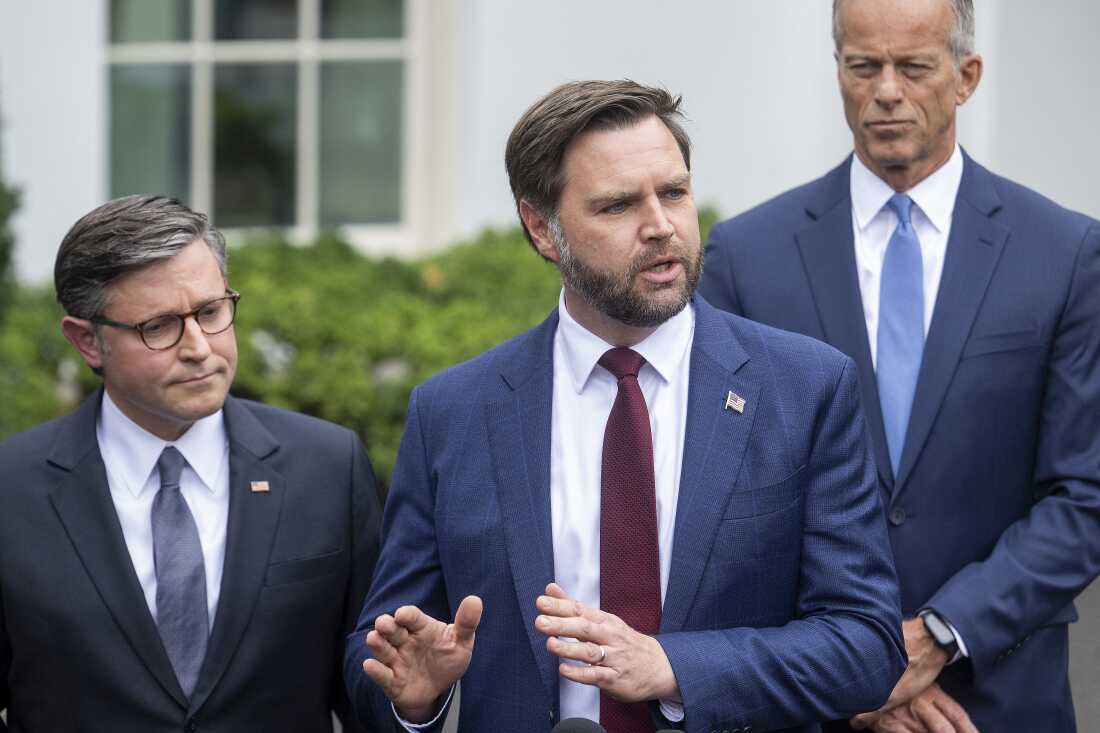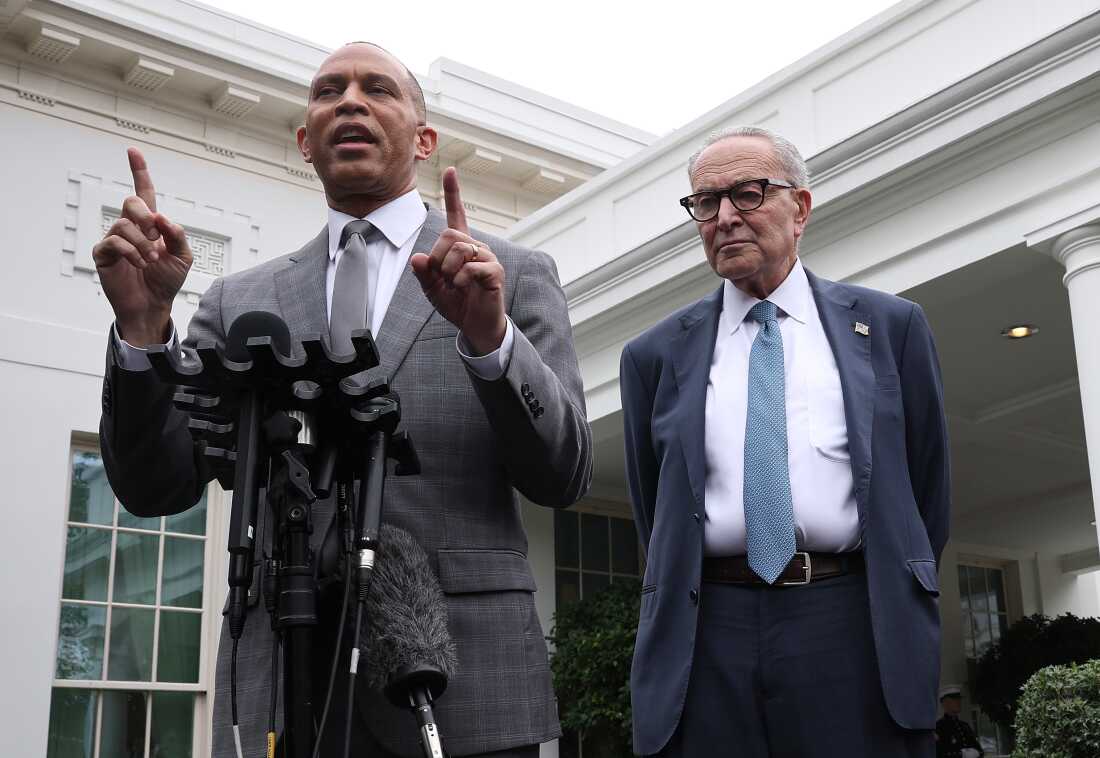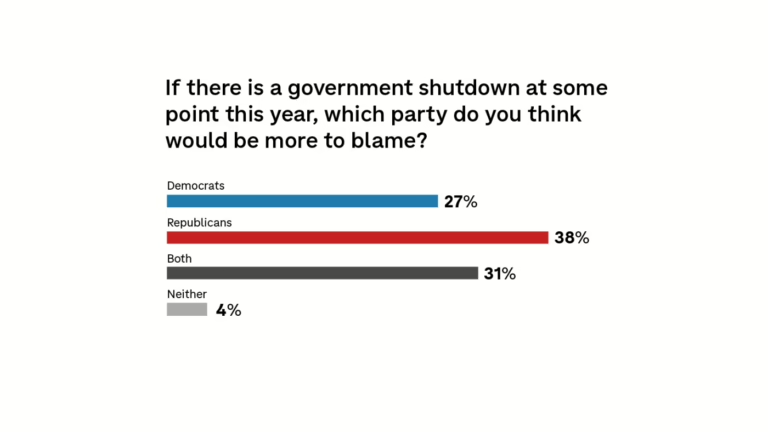According to a recent NPR/PBS News/Marist survey, Republicans are held marginally more responsible than Democrats for a possible government shutdown, though nearly one-third of participants assign blame to both parties.
Rahul Mukherjee/NPR/PBS News/Marist Poll
toggle caption
Rahul Mukherjee/NPR/PBS News/Marist Poll
A recent NPR/PBS News/Marist poll reveals that if the federal government were to shut down, Republicans would be more frequently held accountable than Democrats. However, a considerable portion of respondents believe both parties share the responsibility equally.
The survey indicates that 38% of participants would blame Republicans for a shutdown, compared to 27% who would fault Democrats. Meanwhile, about 30% of those surveyed think the fault lies with both parties. Among independents, 40% attribute equal blame to both sides.
Debra Sudbeck, a 71-year-old independent from Nebraska, expressed frustration: “Neither side is willing to find common ground. Republicans seem intent on provoking Democrats, and Democrats respond in kind. It’s like watching two children bickering endlessly.”
This poll adds complexity as the government faces a shutdown deadline at midnight Tuesday if no agreement is reached. Earlier this year, some Democrats were displeased with Senate Majority Leader Chuck Schumer for negotiating a last-minute deal to prevent a shutdown.
Opinions among Democrats remain divided on the best course of action. Across party lines, respondents are split on whether it is more crucial to compromise to avoid a shutdown or to uphold principles even if it leads to one. Democrats and independents tend to favor compromise, whereas Republicans lean toward standing firm on principles.
Interestingly, the generational divide is nuanced. Both Generation Z and Baby Boomers are more inclined to support compromise, while Millennials and Generation X are more likely to advocate standing on principle.
Trump’s Approval Rating Hits New Low in Second Term, While Congressional Democrats Face Even Greater Disapproval
President Trump’s approval rating currently stands at 41%, with 53% disapproving, marking the lowest point of his second term so far, though still within the margin of error compared to earlier ratings this year.
His approval among independents is notably low at 31%, yet he maintains strong support from his Republican base, with 87% approval.

Vice President Vance addresses reporters outside the White House alongside Speaker Mike Johnson and Senate Majority Leader John Thune on Sept. 29, 2025, following talks with Republican leadership and President Trump regarding a possible government shutdown.
Jim Watson/AFP via Getty Images
toggle caption
Jim Watson/AFP via Getty Images
Dave Cole, a 78-year-old Republican from Colorado, shared his perspective: “He might be rough around the edges, but he’s our leader. Like a seasoned general, he may not always communicate perfectly, but he knows how to win. Trump tells you what he plans to do and follows through, which I respect.”
Conversely, others hold a starkly different view.
Harold Etkin, 78, an independent from Michigan, stated, “He’s the worst president we’ve ever had. He acts like he can target anyone, declares national emergencies to bypass laws, and undermines the system.”
Despite expanding his support among Latino and younger voters in 2024, only 36% of Latinos and 24% of Generation Z approve of Trump’s presidency. The latter figure is his lowest approval rating among any age group by a significant margin.
Notably, strong disapproval is high, with 46% expressing intense dissatisfaction-the highest level this term-potentially signaling challenges for Trump in the upcoming midterm elections amid ongoing economic concerns.
Previous Marist polls have highlighted declining approval for Trump’s economic and trade policies.

House Democratic Leader Hakeem Jeffries and Senate Democratic Leader Charles Schumer address the media after meeting with President Trump at the White House on Sept. 29, 2025, to negotiate funding measures aimed at preventing a government shutdown.
Win McNamee/Getty Images
toggle caption
Win McNamee/Getty Images
While Trump’s popularity is waning, Congressional Democrats face even harsher criticism from voters across the political spectrum.
Only 25% of Americans approve of the job Democrats in Congress are doing, with 62% disapproving. Republicans fare slightly better, with 35% approval and 55% disapproval.
Approval ratings among independents are particularly low: just 19% support Democrats in Congress, and only 26% back Republicans.
These figures are consistent with July’s poll results, but Democrats continue to lag behind Republicans, largely due to dissatisfaction within their own ranks.
Less than half of Democrats (48%) approve of their party’s Congressional performance, whereas 77% of Republicans express approval of their representatives.
Robert Jenkins, a 59-year-old Democrat from Pennsylvania, criticized his party: “They lack backbone. Republicans are running circles around them, and they let it happen. They need to stand up and fight back, no matter what it takes.”
The survey, conducted from September 22 to 26 with 1,477 adults, carries a margin of error of ±3.1 percentage points. Participants were contacted via cell phone, landline, text, or online, in both English and Spanish.

















